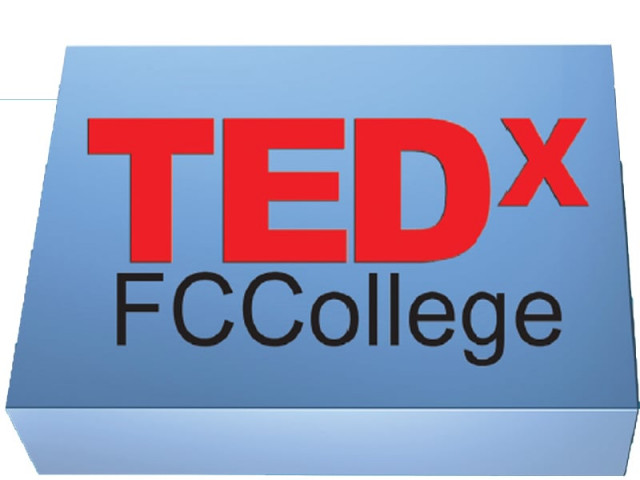TEDx talk: ‘Reform schools to encourage innovation’
Education system largely ignores practical training, creative thinking, say speakers.

The education system must be reformed to encourage creativity and entrepreneurship and the use of digital media for learning, said speakers at a TEDx talk at Forman Christian College on Saturday.
The event, titled ‘Innovation – Harnessing the Hidden Revolution’, featured seven speakers who gave advice for aspiring entrepreneurs and suggested innovative reforms to schools in Pakistan.
“Pakistan could have a 100 per cent literacy rate if kids in colleges are made to do 36 hours of community service each and spread their knowledge. I firmly believe that within a year. Pakistan would be 100 per cent literate,” said Ali Raza, the chief executive officer of Youth Engagement Services (YES) Network Pakistan.
Raza said that schools and universities should encourage students to “innovate, imagine, feel and invent”, but they did not. He said YES sought to help students what they learned in classrooms to real life. The organisation is to launch the Youth Social Entrepreneurship programme in 23 colleges across Pakistan in which students will learn to apply entrepreneurial ideas.
“We held workshops recently in Faisalabad where college students, starting with capital of as little as Rs1,000, came up with ideas generating profits of up to Rs30,000,” he said. “We can excel as a nation and overcome the global challenges if we treat Pakistan’s youth as a source and a solution, and not the problem.”
Raza said though enrolment in schools had gone up over the last few years in Pakistan, social indicators had gone down in the country. He said that schools did not encourage students to be innovative or be prepared to deal with practical realities.

“Youths under the age of 29 comprise 68.8 per cent of Pakistan’s population. As much as 17 per cent of the population is enrolled in educational institutes not encouraging students to be innovative. Instead, most treat students as vessels in which they can pour in information,” Raza said.
Lawyer Zeeshan Hashmi said that schools and colleges often ignored practical matters. For example, law schools here rarely held mock trials where students could seek to implement their research and argument skills. They also did not take part in international moot court competitions. “They fear losing and do not want to confront their fears,” he said. “Even if they do not win international moot competitions, they will still gain experience if they participate,” he said.
He said that the lawyers who argued cases at the Lahore High Court lacked rhetorical and oratory skill as they were not trained when in college.
Zahra Ali, founder and CEO of Ghonsla, which makes insulation out of recyclable materials and provides it to owners of poor households in the Northern Areas, spoke about the need for young people to “take up every opportunity to improve an idea for a product they imagine to work”.
She quoted a famous verse of Jalaluddin Rumi’s: “Don’t seek water, seek thirst.”
“We need similarly to seek innovative methods with not only an immediate impact but a lasting one too,” she said.
Amin Hashwani of the Hashwani Group, who helped launch the Aman Ki Aasha peace initiative, spoke about Pakistan’s economic growth in its first 20 years and what was needed to change the current situation.
He said though Pakistan stood at 149 of 150 nations on a global peace index, a recent survey also showed it to be the most philanthropic country in terms of the proportion of per capita earnings given to charity. The devastating floods of the last few years showed how Pakistan has active and selfless young people willing to volunteer to help others, he said.
Hashwani said he was working on a project, with writer Karen Armstrong, to build 5,000 schools by the end of 2014. The schools would have teachers trained to use unconventional methods to encourage students to be imaginative. He ended with a quote from Albert Einstien: “The world we have created is a product of our thinking; it cannot be changed without changing our thinking.”
Genetic scientist Mohammad Adeel said there was a lack of attention on science in Pakistan. “When I tell people that I work in a laboratory, they mistake me for a technician. A great number of students graduating with a biotechnology degree are compelled to take up teaching jobs as no funds are available for research,” he said.
Filmmaker Mashal Peerzada suggested that mobile phones be used to educate Pakistanis. “Every household in Pakistan has at least one mobile phone. We have to find ways of educating people through their phones. We need to expose the youth to creative learning strategies,” she said.
Two videos of TedX events in the US and the UK about evolving global technologies were also shown to the audience, which mostly consisted of FC College business, science and journalism students.
Published in The Express Tribune, December 9th, 2012.



















COMMENTS
Comments are moderated and generally will be posted if they are on-topic and not abusive.
For more information, please see our Comments FAQ